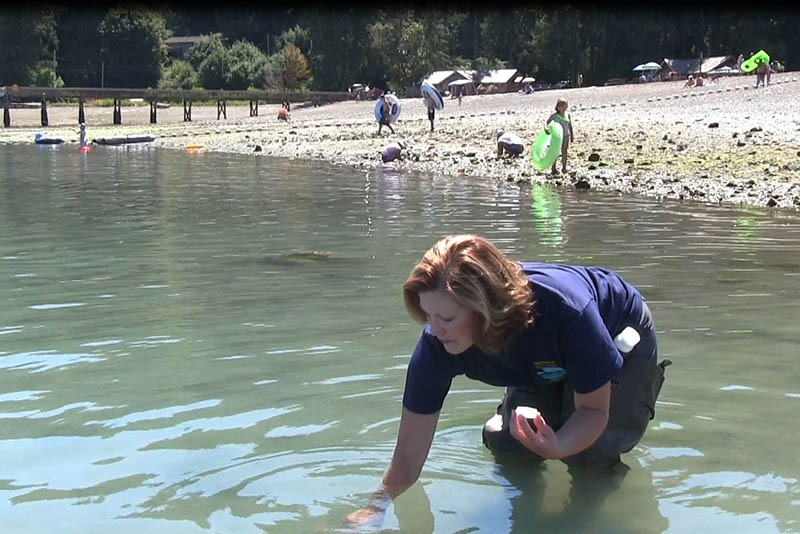Monitoring bacteria in Puget Sound
High bacteria levels in Puget Sound are a risk to human health. People can be exposed to illnesses when they swim and play in the water. In addition, shellfish are not safe to eat when bacteria levels are high.
We monitor beaches for bacterial contamination to protect the public from illness.
To determine if pathogenic bacteria are present, we sample for indicator bacteria called fecal coliform that come from the digestive tract of warm-blooded animals. Also known as E.coli, and Enterococci, these bacteria indicate the possible presence of harmful bacteria, viruses, and other pathogenic organisms in the water. If we see high levels of an indicator bacteria, we assume pathogenic organisms could be present.
Bacteria sources
Most pathogenic bacteria originate from human or animal waste sources. Possible sources of bacterial contamination include:
- Failing on-site septic systems
- Boat waste discharge
- Stormwater
- Wastewater treatment plant or infrastructure malfunctions
- Sewage overflows
- Pet waste
- Livestock waste
- Wildlife
Bacteria can be directly discharged to Puget Sound from these sources or indirectly from rivers and streams that flow to the Sound. Stormwater runoff carries bacteria from upland areas to streams, rivers, and Puget Sound. Improper disposal of human and animal waste contributes to bacterial pollution as well as excess nutrients to Puget Sound.
Unlike other water quality pollutants, bacteria levels in a water body can fluctuate from day to day. Many environmental factors influence bacteria levels. Stormwater runoff, wind, and tides can transport bacteria in Puget Sound. Die-off of bacteria and viruses occurs in the environment due to various factors, such as temperature, sunlight, and predation. This makes it difficult to track the sources of bacterial contamination.
Key challenges in reducing bacteria levels
Keeping water clean
State agencies measure bacteria levels in Puget Sound to ensure that water is safe to swim and play in and shellfish are clean and safe to eat. The state Department of Health provides a Shellfish Safety Map with current information.
Our BEACH Program provides swimming beach information, including a map of closed beaches and those with advisories due to bacterial contamination, as well as a section on how to help your local beach.
We issue permits to wastewater treatment plants allowing them to discharge treated wastewater. We set pollution discharge limits in the permits and provide technical support to ensure they are operating at the highest standards to protect Puget Sound.
Some counties have set up Pollution Identification and Correction (PIC) programs. These programs can be an effective way to clean up pollution from on-site septic systems and livestock. PIC programs conduct monitoring to identify bacteria sources and work with property owners to correct problems using multiple approaches such as outreach, technical assistance, incentives and, if necessary, enforcement.


